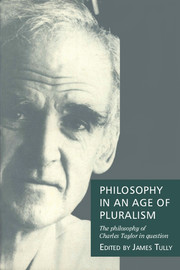Book contents
- Frontmatter
- Contents
- Notes on the contributors
- Preface
- Acknowledgements
- Introduction
- Part I Foundations
- Part II Interpreting modernity
- Part III Natural and human sciences
- Part IV Philosophy in practice
- Part V Ethics, politics and pluralism
- 10 Rights and pluralism
- 11 The political theory of strong evaluation
- 12 Philosophy and political judgement in a multinational federation
- Part VI Reply and re-articulation
- Bibliography of the works of Charles Taylor
- Index
11 - The political theory of strong evaluation
Published online by Cambridge University Press: 05 June 2012
- Frontmatter
- Contents
- Notes on the contributors
- Preface
- Acknowledgements
- Introduction
- Part I Foundations
- Part II Interpreting modernity
- Part III Natural and human sciences
- Part IV Philosophy in practice
- Part V Ethics, politics and pluralism
- 10 Rights and pluralism
- 11 The political theory of strong evaluation
- 12 Philosophy and political judgement in a multinational federation
- Part VI Reply and re-articulation
- Bibliography of the works of Charles Taylor
- Index
Summary
Reading Charles Taylor's work, one is struck both by its breadth and by its remarkable consistency. An underlying intention of Taylor's writings as a whole has been to oppose the reductive impulse which has marked many of the human sciences since the seventeenth century, and which seeks to account for various aspects of human life in terms provided by explanatory theories derived from the natural sciences. Thus, he was an early critic of behaviourism in the philosophy of psychology, and has defended an ‘expressivist’ theory of meaning against the truth-conditional theories which have become something of an orthodoxy in the philosophy of language. In these fields and in many others, Taylor has sought to restore a dimension of meaning and significance which is too often ignored by philosophies of man of a more naturalistic bent. Taylor himself has characterised his work as that of a ‘monomaniac’, pursuing ‘a single rather tightly related agenda’ through a number of seemingly unrelated areas of philosophy. My intention in this paper is to take Taylor at his word, and to assess the consistency of his contributions to the areas of the philosophy of action and of political philosophy.
One of Taylor's principal philosophical achievements has been to discredit a view of human agency according to which action can be understood solely in terms of agents' preferences and of their efforts to satisfy these preferences, and to suggest the greater plausibility of a model emphasising agents' second-order reflection upon such preferences, and the evaluative frameworks which make such second-order reasoning possible.
- Type
- Chapter
- Information
- Philosophy in an Age of PluralismThe Philosophy of Charles Taylor in Question, pp. 171 - 193Publisher: Cambridge University PressPrint publication year: 1994
- 4
- Cited by



